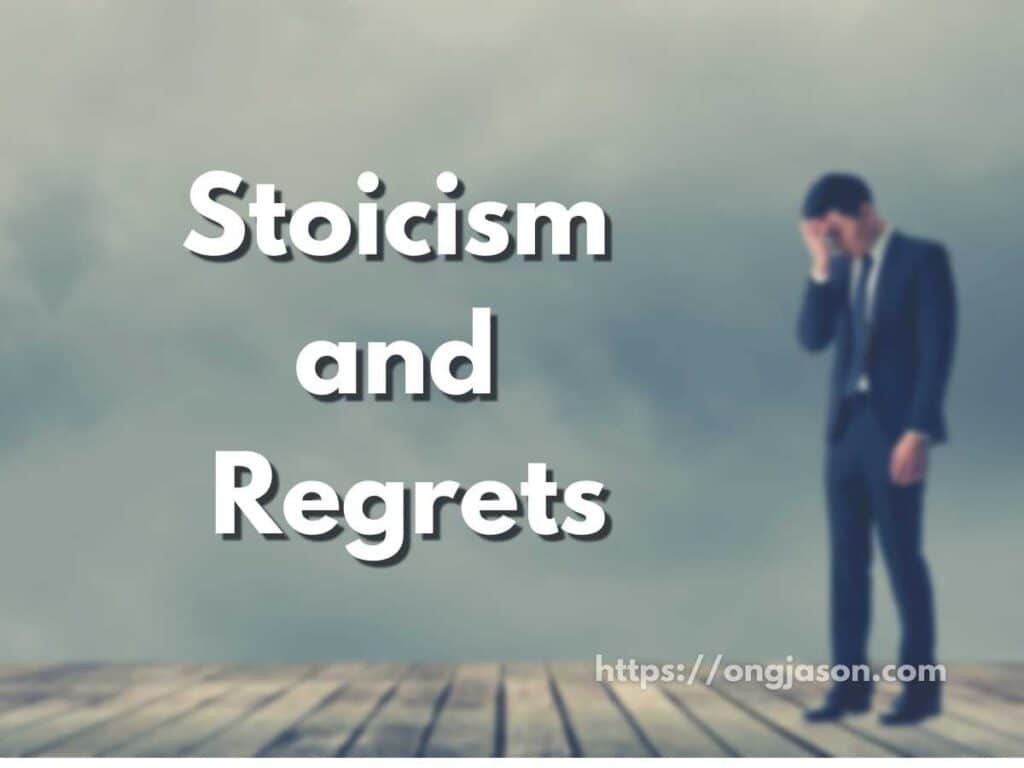Stoicism and Regrets: What Stoics Think Of Regret And How To Deal With Them.
We all make mistakes. It might be from our lack of knowledge or some intense emotions that caused these mistakes. These mistakes often lead to regrets which can harm our perception and hopes for the future. During the times when we feel regret, what does Stoicism teaches us? What do Stoics think of regret, and how do stoics deal with them.
The Stoics deal with regrets by understanding the dichotomy of control. The dichotomy of control states that we shouldn’t mind things beyond our control. For the Stoics, regrets are part of the past that we usually have no control over. However, the Stoics also know that there are some mistakes or regrets that can be fixed.
In this blog post, we are going to go deeper into Stoicism and regrets. When do Stoics do something about these regrets, and when would they not mind these regrets. Furthermore, I will share the three-step Stoic process for handling regrets.

Do Stoics have regrets?
The Stoics have regrets because regrets are an inevitable part of life. Since we all make mistakes, there will be times when we will experience regrets. However, what makes a Stoic different is that they know how to react appropriately to these regrets. They respond to regrets more rationally, making them generally happier and more resilient.
To start, I would like to debunk a common misconception which is that Stoics are emotionless.
What I mean by this is some people wonder if Stoics experience regret in the first place.
As humans, we all make mistakes. Unfortunately, these mistakes can sometimes cause regrets.
Using this analogy, we can say that since Stoics can also make mistakes, they can experience regret.
You see, the Stoics believe that regrets are a part of life. Some regrets can be mended and be fixed by making us better.
However, there are some forms of regret that you can’t prevent.
Life is unpredictable. This means there will be times where we accidentally make mistakes that cause regret.
For example, you are driving safely, following all traffic rules, and driving in optimal condition.
Suddenly, someone crossed the street while not following traffic signs, making you lose control, and an accident occurred.
Often, you will regret these things from happening. However, you have no control over the person who crossed the road without following the streetlights.
Due to the unpredictability of life, all people would experience mistakes and regrets. Thus, the Stoics also share these regrets.
However, what makes a Stoic resilient and happy despite these regrets is how they deal with them.
Since we make mistakes, how we deal with these mistakes makes the difference.
The Stoic way of dealing with regrets and setbacks is what makes Stoicism an excellent philosophy to learn.
How do Stoics deal with regret?
The Stoics deal with regret by understanding that our past mistakes are outside our control. This means we can’t do anything to change what happened in the past. So instead, the Stoics handle regrets by learning to prevent the same mistake from happening again.
The Stoics also understand that mistakes occur naturally, which means accepting them helps them cope with life.
As we already discussed, regrets are always a part of life. This is also one of the reasons why Stoics are resilient during these trying times.
I am going to introduce you to the dichotomy of control, which is one of the fundamental teachings of Stoicism.
The dichotomy of control means there are things we can and can’t control. For the Stoics, we shouldn’t mind things we can’t control. Instead, we should mind the things we can control.
Regrets are usually the mistakes we made in the past. Since we can’t control or change what happened in the past, this means Stoics wouldn’t care about the past.
However, there are some things we did in the past which we can mend. Thus, proper judgment is necessary as Stoicism is about handling things from a rational perspective.
Another thing following the dichotomy of control is the understanding that regrets will be a part of life. As with my example above, there will be times where we will make mistakes even if we didn’t intend them to happen.
Thus, the Stoics accept these mistakes. They own their mistakes and do not run away from them.
Remember that acceptance is one of the keys to happiness. Since Stoics accept these mistakes for what they are, they generally live a more peaceful life.
Going back to the dichotomy of control, since we can’t control or change the past, we can control how we will act and think in the present.
For Stoics, life is the present moment or what they call the “now.” Therefore, living your life from your past mistakes is not living your life to the fullest.
Thus, what’s done is already done. What we can do is to accept and learn from these mistakes, so it doesn’t happen again in the future.
Accepting these mistakes doesn’t mean that Stoics run away from their responsibilities caused by these errors.
This means that Stoics care about their mistakes. They accept these mistakes as a part of life.
Just because what’s done is already done, it doesn’t mean that we should not learn from these mistakes.
Of course, there are also times where we can’t learn anything from our mistakes.
There are times where the world throws terrible things at us. The world is an unpredictable place.
Maybe, you might be really careful, and some unforeseen events resulted in regret and guilt.
These are the moments where we should also follow the dichotomy of control. There are things we regret that don’t give us any learning. They’re just bad events.
In those times, a Stoic won’t mind them as they can’t do something about it. Therefore, they can’t learn from the experience and prepare for it in the future.
But regrets that don’t provide any learning opportunities for us are rare.
Now that I’ve given some insights into how stoics deal with regrets, I will share a simple three-step process for dealing with them.
The Stoic’s three-step way of dealing with regrets:
- Accepting the mistake
- Examining if the mistake is under your control
- Doing according to your virtues
1. Accepting your mistake
The first step is always acceptance.
Since mistakes are inevitable, we should accept these mistakes instead of running from them.
Remember that running from these mistakes would usually cause these mistakes to happen again in the future.
There will also be times where we will be reminded of these mistakes if we don’t accept them.
Thus, own your mistakes. You’re not the only person in the world who has regrets.
2. Examining if the mistake is under your control
Now, let’s do the dichotomy of control.
Answer the following:
- Did these regrets happen because I did something wrong?
- What can I do to prevent this mistake from happening again?
- Can I learn something from this mistake?
3. Doing according to your virtues
The next is doing.
If it’s under your control, then do something about them. Learn from your mistake. Make sure to have a plan to prevent the same error from happening again.
If not, then don’t mind and accept that mistakes are an inevitable part of life.
In doing, it is also worth noting that the Stoics follow a specific set of virtues. These are wisdom, justice, courage, and temperance.
Note: You can apply this three-step Stoic process to almost all the things that happen to us, such as dealing with emotions, experiences, and many more. For a detailed guide on the three-step process, feel free to check this blog post: How do Stoics handle Emotions?
What is the point of regret?
The point of regret is to tell us that there is something wrong. Regrets give us a clear view of our values and if they are aligned with our actions. Thus, regrets offer a way for us to learn from our mistakes, fix them based on our moral virtues, and prevent these mistakes from happening again.
Regrets are there to tell us that there is something wrong. It gives us the power to see between what’s right and wrong.
Thus, regrets or guilt serve as a reminder that we shouldn’t do the same thing again.
Furthermore, it helps us understand that we did something wrong in the past and learn from them.
Regrets guide us to live according to our virtues and to make ourselves better.
So, accept that we make mistakes, and we all experience regret. Now that you know how a Stoic handles regrets, I hope you can apply the three-step process to live a happier life.
What’s next? If you’re interested in love and heartbreaks in the Stoic’s view, you may visit this blog post: The Stoic Ways in Dealing with Heartbreak.

“Only the things I love.“
ongjason.com is reader-supported. When you buy through links on the site, I earn an affiliate commission.
If you’re following me, you’ll know that I believe it is essential to have some tools, whether it’s for personal development or lifestyle in general.
So, here are the things I love.
YouTube
If you want to learn things for free, I recommend watching my YouTube Channel. Click the Button Below to go straight into my Channel. 🙂
Okay, let me first explain my Channel.
I believe that I really can’t explain everything too well on my blog. That’s why I created a YouTube Channel so I can easily explain a lot of things. Plus, I believe that Video Sharing is the future.
Recommended Books
The next thing is books. Books are, for me, one of the cheapest ways to get invaluable information. We can learn personal development, finance, career, relationships, and many more from books.
Here, I will be listing my favorite books in different categories.
- For Beginners – 7 Habits of Highly Effective People by Stephen Covey – Personal development has a lot of concepts and ideas to learn. Thus it can be really hard for beginners to know where to start. Thus, I recommend this book since all the basic concepts of personal development are here(except finance, check what I recommended for that)
- Productivity – The One Thing by Gary Keller – This book teaches us the power of focusing on one thing which is the ultimate source of productivity. The concepts taught are what I am using to constantly publish YouTube videos while maintaining this website.
- Busy? – Make Time by Jack Knapp – This book teaches us how to make time for the things we love. The concept is really simple but I think that makes it a book worth reading.
- Health – Lifespan by Dr.Sinclair – This Book teaches about the latest scientific research on lifespan. In his book, he has shared numerous things he is doing to slow down his aging process. This can be as easy as eating less which he recommends.
- Finance – The Richest Man in Babylon by George Clason – Perhaps one of the first books I’ve read about Finance, this book for me is the best if we are talking about learning basic finance such as basic saving and investing. The concepts are very simple but effective.
Audiobooks
Take this advice as a grain of salt.
I don’t recommend buying Audiobooks one by one. I mean, audiobooks can be quickly finished by listening while working out or doing some mindless tasks.
So here is to save you some money. Just go for a monthly subscription to Audible. I believe that you will save a lot of money with that plus, they usually give freebies to anyone starting.
My Audiobook Recommendation will always be the same as my book recommendations, but I personally like The 5 Second Rule by Mel Robbins. I like how she is so casual while reading her book.






